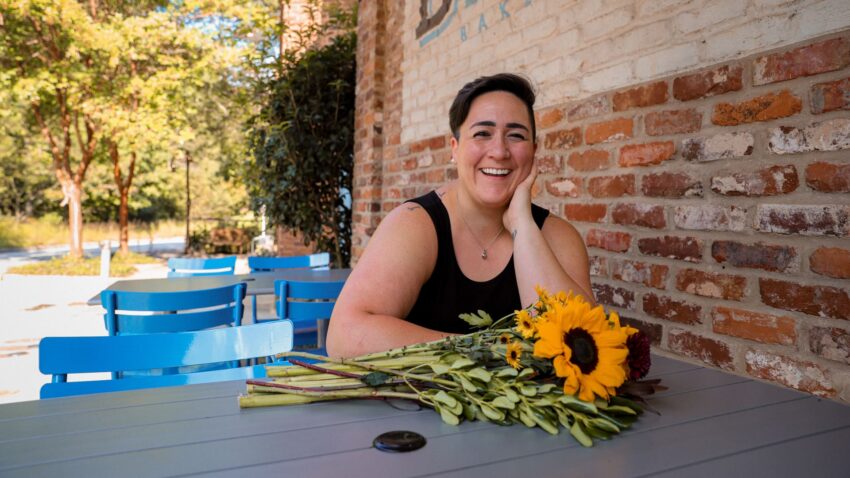Liz Whalen co-owns Insurgent Insurgent, a hair salon in Libertyville, Unwell. that caters to LGTBQ+ purchasers.
Courtesy: Lissete Briggs
Within the face of the anti-diversity, fairness and inclusion atmosphere, LBGTQ+ small enterprise house owners have remained resilient — and are literally beginning companies in file numbers.
Some 10% of entrepreneurs who began their very own companies final yr recognized as LGBTQ — a “milestone” and a 50% improve from 2023, in keeping with a current survey from small enterprise software program firm Gusto. That brings the LGBTQ entrepreneurship illustration in step with the overall inhabitants, the corporate stated.
“For too lengthy, LGBTQ entrepreneurs have confronted boundaries to capital, visibility, and alternative,” Nich Tremper, Gusto’s senior economist, stated in an e-mail. “Reaching parity in enterprise creation exhibits that extra LGBTQ persons are not solely getting into entrepreneurship, however doing so on their very own phrases — constructing firms rooted in care, autonomy, and neighborhood.”
A couple of third of LGBTQ entrepreneurs stated they began a enterprise so they could be a optimistic affect on their neighborhood.
For 38-year-old Lissete Briggs, who goes by Liz Whalen, opening up her hair salon Insurgent Insurgent in Libertyville, Illinois, was a approach to give a secure house to her purchasers. She began her enterprise with former co-worker Ashley Levin in 2020 after working within the business for a number of years. The salon they labored for on the time was very conservative, Whalen stated.
“I’ve a variety of gender queer, non-binary and trans purchasers, and so they undoubtedly didn’t really feel comfy there, so it was not an excellent match for me,” she defined. “We wished a extra inclusive house.”
Whalen is not feeling any of the results of the backlash towards DEI and solely feels help from her purchasers and her neighborhood, together with a neighborhood LGBTQ+ heart.
“They help us. We help them,” Whalen stated. “It is actually a good looking factor to see all people type of come collectively and help our little enterprise.”
Financial affect of $1.7 trillion
Jonathan Lovitz, senior vp of campaigns and communications on the Human Rights Marketing campaign, stated that’s emblemantic of the neighborhood throughout the board within the face of any anti-DEI efforts or cuts to small enterprise funding.
President Donald Trump has signed govt orders concentrating on DEI applications in each enterprise and the general public sector. The administration has additionally proposed cuts to the Small Enterprise Administration.
“LGBT enterprise house owners are terribly resilient,” Lovitz stated.
The typical American small enterprise goes beneath across the five-year mark, however these which can be licensed LBGTQ+ are, on common, 12 years or older, he famous.
“They’re already good at sticking it out via the powerful instances,” Lovitz added. “The pendulum swings backwards and forwards on authorities and company help, however these firms are thriving as a result of they’re nice firms.”
Actually, LBGTQ-owned companies contribute $1.7 trillion to the USA financial system, in keeping with the Nationwide LGBT Chamber of Commerce.
Being your personal boss
Danielle Stinger is the proprietor of Dandi Cleansing & Organizing in Atlanta.
Courtesy: Danielle Stinger
Danielle Stinger, who owns Dandi Cleansing & Organizing in Atlanta, is a kind of companies. Stinger, who’s 37 years previous and likewise considers herself pansexual, began her enterprise in 2022, after doing it as a aspect hustle for years.
“Within the political atmosphere that we’re in, particularly with the final election, … I’ve misplaced purchasers due to my selection within the LGBT neighborhood and good riddance,” stated Stringer, who’s at present in a relationship with a person after an 8-year relationship with a girl.
Nonetheless, she’s additionally discovered a variety of help.
“The wonderful thing about being your personal enterprise proprietor is that you just’re allowed to decide on — you get to decide on who you’re employed with and who you do not work with,” she stated.
Gusto’s Tremper stated that may be a profit that many in the neighborhood probably crave.
“LGBTQ founders have been 30% extra probably than non-LGBTQ founders to say that they began their enterprise with the intention to be their very own boss,” he stated. “This might sign a need for extra autonomy, however for historically marginalized teams it is also doable that they are beginning a enterprise to keep away from discrimination — both overt or extra delicate — within the conventional office.”







